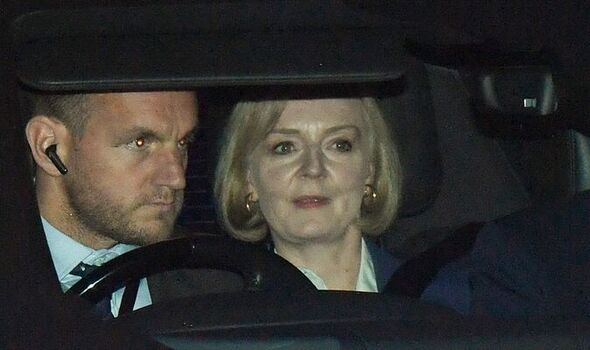What happens if Liz Truss resigns today?
Prime Minister Liz Truss has had the worst start to her premiership than any other PM. And the last 48 hours in Westminster have been chaos.
There are rumours that the Liz Truss era is fast approaching its end, and many are plotting to oust her from No 10.
She has only been in the job since September 5.
In that time, the Queen died, Liz Truss crashed the economy, her mini-budget has been ripped up and replaced with policies that she campaigned against during the leadership race, she fired her chancellor and replaced him with a Rishi Sunak supporter, her home secretary resigned and offered up a scathing letter and there were reports of bullying from her cabinet at last night’s Commons vote.
Chancellor Kwasi Kwarteng was fired after the mini-budget spooked the financial markets. Many argue that Truss should have gone with him as it was her financial vision as his.
READ – PM in crisis: Suella Braverman quits and voting chaos
How does a Tory leadership election work?
According to the 1922 Committee, an incumbent Tory PM cannot face a confidence vote within their first year on the job. But there is speculation that this rule could be changed.
After that 12-month period, to trigger a contest vote, 15 per cent of Tory MPs would have to submit letters of no confidence to 1922 Committee chair, Sir Graham Brady. If at least 50 per cent of MPs then vote no-confidence in their leader, a leadership election begins.
Tory MPs who want to be in the race for the top job will then seek nominations from their colleagues. There will be a series of ballots which will see all the candidates whittled down to just two. The rank and file of the Conservative party will then choose the winner.

Boris Johnson won the general election in 2019 and although he was ousted and replaced with Truss there is no requirement for the Conservative party to call a general election.
Some MPs are understood to want to avoid putting the vote back to the ordinary members of the party. The Telegraph says some MPs want the parliamentary party to choose Truss’s successor, though others warn that this would require a complicated rule change.
This aligns with newspaper reports that say the Tories want to put Rishi Sunak and Penny Mordaunt in office on a “golden ticket” type deal.
READ – Can Liz Truss save her job?
What happens if Liz Truss resigns today?
If Liz Truss resigns as Conservative leader and Prime Minister today, a leadership contest would begin.
Those wanting to get into No 10 would begin trying to get support for their campaign.
However, it is possible that the Tory parliamentary party could rally around a single candidate for the leadership. This would perhaps be seen as a better option as it will avoid time-wasting.
If Truss does not resign and attempts to cling on to power against the will of MPs and peers, the 1922 Committee could and would likely change the rules to allow an early challenge to her (changing the 12-month rule). This would likely see her removal from both leadership of the party and as prime minister.
Can we have a general election?
Labour and Liberal Democrats are amongst those calling for an early general election. But the government is not legally obliged to hold another general election before January 2025 – surely to the delight of Conservatives as the latest opinion polls suggest the Tories would lose most of their seats.
LIVE BLOG- PM RESIGNS
Autosport Retro Podcast Celebrates Iconic F1 Seasons
The Autosport Retro Podcast is concluding its series “My Favourite F1 Season” with a compelling look at some of the most notable campaigns in Formula 1 history. In the series finale, host and Autosport Editor-In-Chief Kevin Turner, along with motorsport correspondent Gary Watkins and F1 writer Stuart Codling, delve into seasons that narrowly missed selection, sparking discussions on both modern classics and historic competitions. With standout mentions from the controversial 2021 season to the intriguing dynamics of the 1958 championship, this finale promises to resonate with devoted F1 fans.
A Journey Through F1 History
Modern Classics and Timeless Battles
The podcast’s rich tapestry spans decades, reflecting the evolution of Formula 1 racing. Key highlights include the 2021 season, marked by fierce rivalries and a dramatic finale that left fans divided. Additionally, the show revisits the legendary 1958 season, where Stirling Moss’s heartbreak against Mike Hawthorn exemplified the razor-thin margins in championship battles.
Iconic Rivalries: 1979 Season
Among the notable seasons discussed is 1979, featuring the captivating rivalry between Jody Scheckter and Gilles Villeneuve. Their battle not only defined the championship but also captured the imagination of fans with its thrilling moments and unpredictable outcomes. Turner and his guests explore what made this rivalry so special and how it influenced the sport’s narrative.
What Makes a Great F1 Season?
Throughout the discussion, the panel also reflects on the key elements that contribute to a “great” Formula 1 season. From intense rivalries to unexpected plot twists, their insights offer a deeper understanding of what captivates fans and defines success in the sport.
Conclusion: F1’s Lasting Legacy
As the podcast series wraps up, it serves as a poignant reminder of the drama and excitement that Formula 1 offers on and off the track. The final episode not only celebrates the unforgettable moments of the past but also sets the stage for the future of this exhilarating sport.
For those passionate about F1, the Autosport Retro Podcast series is a treasure trove of insights and nostalgia, providing an engaging platform to relive the greatest seasons and appreciate the legacies of legendary drivers.





